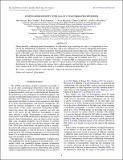Files in this item
Testing homogeneity with galaxy star formation histories
Item metadata
| dc.contributor.author | Hoyle, Ben | |
| dc.contributor.author | Tojeiro, Rita | |
| dc.contributor.author | Jimenez, Raul | |
| dc.contributor.author | Heavens, Alan | |
| dc.contributor.author | Clarkson, Chris | |
| dc.contributor.author | Maartens, Roy | |
| dc.date.accessioned | 2018-10-17T15:30:25Z | |
| dc.date.available | 2018-10-17T15:30:25Z | |
| dc.date.issued | 2012-12-12 | |
| dc.identifier | 171423390 | |
| dc.identifier | 696a1936-927f-4938-9d7c-2e9c6b0b5021 | |
| dc.identifier | 84873333558 | |
| dc.identifier.citation | Hoyle , B , Tojeiro , R , Jimenez , R , Heavens , A , Clarkson , C & Maartens , R 2012 , ' Testing homogeneity with galaxy star formation histories ' , Astrophysical Journal Letters , vol. 762 , no. 1 , L9 . https://doi.org/10.1088/2041-8205/762/1/L9 | en |
| dc.identifier.issn | 2041-8205 | |
| dc.identifier.other | BibCode: 2013ApJ...762L...9H | |
| dc.identifier.uri | https://hdl.handle.net/10023/16268 | |
| dc.description.abstract | Observationally confirming spatial homogeneity on sufficiently large cosmological scales is of importance to test one of the underpinning assumptions of cosmology, and is also imperative for correctly interpreting dark energy. A challenging aspect of this is that homogeneity must be probed inside our past light cone, while observations take place on the light cone. The star formation history (SFH) in the galaxy fossil record provides a novel way to do this. We calculate the SFH of stacked luminous red galaxy (LRG) spectra obtained from the Sloan Digital Sky Survey. We divide the LRG sample into 12 equal-area contiguous sky patches and 10 redshift slices (0.2 < z < 0.5), which correspond to 120 blocks of volume ~0.04 Gpc3. Using the SFH in a time period that samples the history of the universe between look-back times 11.5 and 13.4 Gyr as a proxy for homogeneity, we calculate the posterior distribution for the excess large-scale variance due to inhomogeneity, and find that the most likely solution is no extra variance at all. At 95% credibility, there is no evidence of deviations larger than 5.8%. | |
| dc.format.extent | 5 | |
| dc.format.extent | 545272 | |
| dc.language.iso | eng | |
| dc.relation.ispartof | Astrophysical Journal Letters | en |
| dc.subject | Cosmology: theory | en |
| dc.subject | Early universe | en |
| dc.subject | Large-scale structure of Universe | en |
| dc.subject | QB Astronomy | en |
| dc.subject.lcc | QB | en |
| dc.title | Testing homogeneity with galaxy star formation histories | en |
| dc.type | Journal article | en |
| dc.contributor.institution | University of St Andrews. School of Physics and Astronomy | en |
| dc.identifier.doi | https://doi.org/10.1088/2041-8205/762/1/L9 | |
| dc.description.status | Peer reviewed | en |
| dc.identifier.url | http://adsabs.harvard.edu/abs/2013ApJ...762L...9H | en |
This item appears in the following Collection(s)
Items in the St Andrews Research Repository are protected by copyright, with all rights reserved, unless otherwise indicated.

